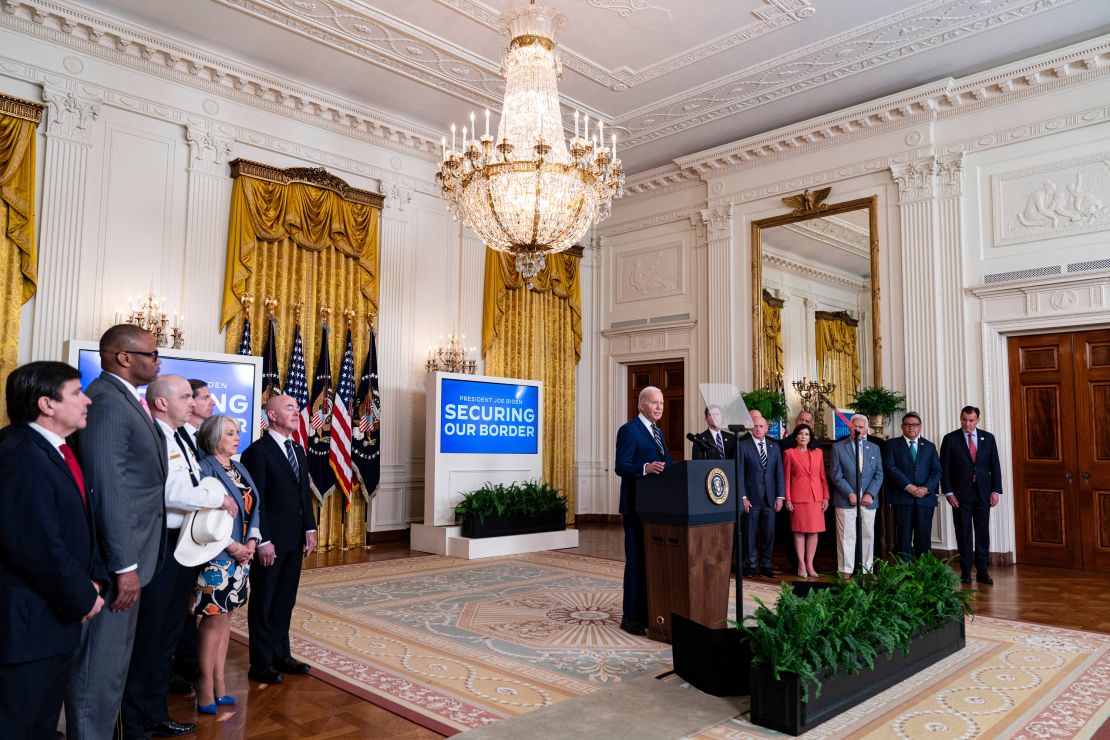With an election looming, President Biden’s new executive action on the border aims to send a loud and clear message about his approach to immigration.
But the realities of what’s next are murky.
Here are three big questions to consider.
Is Biden closing the border?
No, that’s not what’s happening here, though that’s frequently how this approach gets shorthanded –— even by Biden himself.
The president’s proclamation, announced Tuesday, still allows for the normal flow of commerce and legal immigration across the border. But it bars migrants who cross the border illegally from seeking asylum once a daily threshold is met.
When the average number of migrants illegally crossing the border reaches 2,500 a day, migrants who try to cross between ports of entry will be blocked from seeking asylum and turned back to Mexico or returned to their countries of origin. The restrictions would be lifted after the seven-day average drops below 1,500 a day.
Border authorities encountered around 3,500 migrants crossing the border unlawfully on Monday, according to a Homeland Security official, above the threshold needed for the executive action to take effect. The number of migrants illegally crossing the border has been decreasing since reaching a historic high in December, but Biden’s proclamation notes that “a substantial and elevated level of migration…continues to pose significant operational challenges.”
There are some exemptions to the new restrictions, including unaccompanied minors.
And migrants will still be able to use a Customs and Border Protection app to request an appointment to present their asylum claim at a port of entry.
It’s too soon to say whether Biden’s announcement will help or hurt him politically.
Critics argue the measure doesn’t go far enough. And immigrant rights advocates warn that closing the border to asylum seekers will endanger vulnerable people and ultimately make the border less safe.
And beyond the implications at the ballot box, there’s a lot we still don’t know about what this will look like on the ground, particularly since –— unlike a law passed by Congress — executive actions from the president don’t include funding for additional resources. And some experts are already questioning whether the administration ultimately will have the resources to enforce the new policy.

Doesn’t Mexico need to agree to this?
Mexico’s cooperation is a key part of any initiative along the countries’ shared border. We’ve seen US presidents announce immigration initiatives in the past, only to see them fizzle without Mexican support. On the flip side, we’ve also seen significant changes in the numbers at the border in recent months, and multiple times in the past, as Mexico has stepped up enforcement efforts.
In this case, exactly how strong Mexico’s support will be is up in the air. While the Mexican government said President Andres Manuel Lopez Obrador had spoken with Biden Tuesday about migration and other matters, officials haven’t released details about what Mexico will — or won’t — do in connection with Biden’s new executive action.
“They agreed to continue close collaboration between both countries to manage migratory flows in the region and increase efforts to address the structural causes of migration in Latin America and the Caribbean,” the Mexican government’s statement said.
Further complicating matters, Mexico just elected a new leader. President-elect Claudia Sheinbaum’s six-year term is scheduled to begin October 1, just over a month before the US presidential vote.
While she’s signaled she’ll take a similar approach to her predecessor and mentor, Lopez Obrador, campaign promises often shift amid the realities of governing.
Will it get blocked in court?
The new measures were scheduled to go into effect at 12:01 a.m. Wednesday. But before they’d been officially announced the American Civil Liberties Union had already vowed to challenge them in court, arguing that denying migrants the chance to seek asylum is illegal.
We’ve seen similar government efforts to prevent migrants from seeking asylum blocked in court in the past, including a measure the Trump administration pursued, which also faced an ACLU challenge.
That means no matter how strongly this executive action is worded, its days in effect could be numbered.
CNN’s Rosa Flores, Priscilla Alvarez, Donald Judd, Ana Melgar and Karol Suarez contributed to this report.





